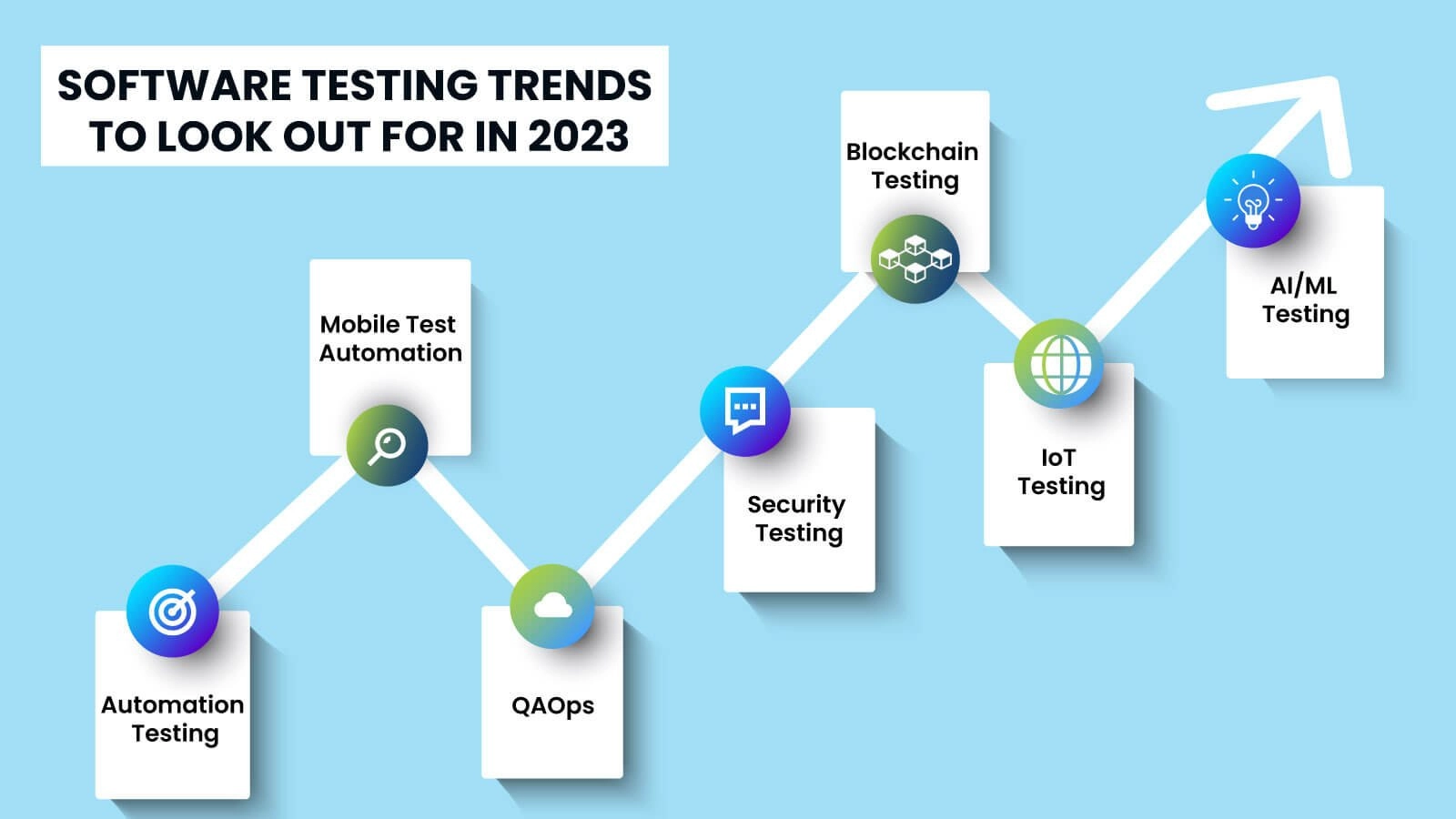Testing is a crucial part of the software development cycle. Dedicating the right time and resources to Quality Assurance (QA) processes helps you create excellent software products and increase customer trust. As QA technologies evolves, so do testing practices, test case management, and test execution. Companies need to stay up to speed with the latest trends in software testing to remain competitive. Here are some of the latest software testing trends to look out for.

Automation Testing
Automation can save testers significant time, money and effort in cases where manual testing proves to be time-consuming, dull and repetitive Many organizations are still widely reliant on manual testing, but the adoption of automation is growing. Testers need to stay updated regarding the latest trends in automation testing, develop skills to create and manage automation strategies, be hands-on with automation and CI/CD tools and frameworks, write automation scripts, have a good grip on programming languages, and know effective test case management. They should also have the flexibility to learn and employ new testing practices such as AI testing and codeless testing that’ll be pivotal for the future for software testing.Mobile Test Automation
To keep up with the new technology in software testing and mobile technology, test automation for mobile is highly needed. This involves automated software testing for native apps, mobile web apps, and hybrid apps across different devices, network operators, and operating systems. With every new version or technology update, mobile apps need to be tested to ensure that existing functionality is not affected. Test automation can be useful across multiple aspects of mobile testing such as testing for usability, performance, interface, and compatibility with different browsers and devices. Adoption of test automation in mobile can speed up testing and increase coverage for the release of high-quality mobile apps and software.QAOps
QAOps is a new testing technology that refers to combining DevOps with the QA function to enhance collaboration between development, IT, and QA departments. Under this practice, QAs work with clients and developers from the very start, discussing requirements, identifying critical test cases and planning testing strategies. By including shift-left testing, i.e., testing earlier in the software development cycle, bugs and issues can be found and fixed before they cause any significant losses. QAOps employs continuous testing and increased automation. This allows for faster and more frequent releases of software and decreases time-to-market while preserving quality. Software testing future trends will see greater adoption of QAOps and related practices.Security Testing
Cybercrime is rising and is now a matter of massive concern in the software development and testing industry. Hackers can easily break into a company’s systems, steal information, alter files and damage business assets and reputation. Reliance on cloud solutions has also exposed companies to more security threats. This is why security testing has become one of the most important software trends in 2023. Security testing involves testing applications and utilizing ethical hacking to find security risks, internal faults, and points of weakness. Finding security loopholes beforehand means organizations can take timely actions to protect their systems and prevent cybercrimes. Hence specialization in security is an increasingly important area for testers to build their skills and keep up with the latest trends in software testing.
Blockchain Testing
A blockchain is a public distributed digital ledger that consists of chained blocks of duplicated data that cannot be altered. Blockchain is used extensively in cryptocurrency systems to maintain secure digital transaction records. Organizations worldwide are adopting blockchain due to the high level of security and transparency it offers. While blockchain has the potential to become a testing technology, there is a lack of testing tools, expertise, and best practices for blockchain testing. There is an increasing need for testers who have knowledge of blockchain testing technology and can decide the right tactics for blockchain testing, create strategies, identify critical focus areas, and perform functional and non-functional testing as needed.IoT Testing
Internet of Things (IoT) testing is one of the most recent QA technologies and trends. IoT refers to smart objects embedded with sensors and software that can exchange data and connect with other devices. Examples of IoT devices include thermostats, smart home security systems, and wearables like smartwatches and fitness bands. IoT testing can be complicated and involves multifaceted testing across various sensors, devices, networks, and applications. Due to the multiple stages and dependencies involved in the IoT testing framework, IoT can be tough to test. Future testers need to ensure that all layers, connected devices and software work together flawlessly. As IoT devices continue to pour in the market, there will be a great need for IoT-based testing experts.AI/ML Testing
The use of Artificial Intelligence (AI) and Machine Learning (ML) in test automation has the potential to be one of the top software technologies. With AI/ML technology, machines use data learning to acquire human-like behavior and skills. As we shift towards increased automation, the next phase as testing evolves is intelligent automation, i.e., using AI in testing. AI-enabled technology can assess testing priorities and decide what tests to run. It can also automatically create test cases based on previous test case examples, automate manual test cases and modify tests in case of UI changes to prevent test failure. The future will soon see the advent of self-healing software that detects and corrects its own problems and removes human interference from the equation altogether. The use of AI/ML in testing is still in its beginning stages, but there will be a rising demand for people with expertise in this area.Conclusion
As technology evolves, so will testing and development practices. QA testers and businesses need to keep up with the changing tech landscape and be aware of the trends that will impact the future of testing. With technology becoming increasingly complicated, there is scope for specialized expertise and niche skills in certain new areas. It is essential for testers to be aware of these and obtain the necessary skills for success.About Testworthy
Simplify testing with our end-to-end test management tool, Testworthy. Streamline your testing processes and effortlessly plan, manage and execute your test cases with one of the best test management tools in the market. Sign up for a free 30-day trial nowFAQs
Software testing can be a great career option in 2023, considering how many companies are moving toward digital transformation. For smooth digital operations, businesses require high-quality, feature-packed, and bug-free software products. A software tester can help eliminate bugs and roll out flawless digital products. Moreover, they can also help digital products scale efficiently to keep up with consumer demands.
Testworthy is the most in-demand test management software in 2023. It has some exciting features that aren't offered by other software testing tools online. Moreover, it also offers seamless integration with tools like Jira.
Automation, performance, and security testing will be in high demand in 2023. As software development becomes more advanced and firms prioritize the need for shorter release cycles and more reliable and secure systems, the demand for this type of testing is expected to increase.